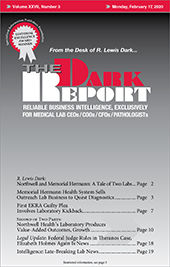>CEO SUMMARY: Need for more capital is probably one reason why Memorial Hermann Health System decided to sell its large clinical laboratory outreach business to Quest Diagnostics in a transaction both organizations announced on Jan. 27. Although terms of the sale were not announced, lab executives in Houston believe that Memorial Hermann will be paid …
Memorial Hermann Sells Outreach Lab to Quest Read More »
To access this post, you must purchase The Dark Report.


